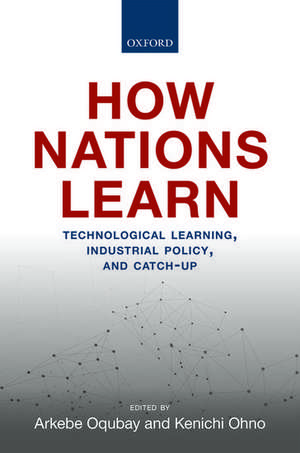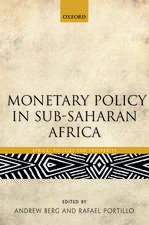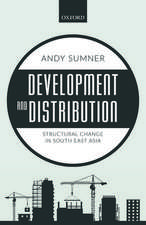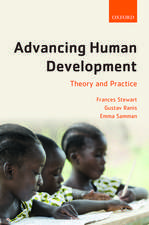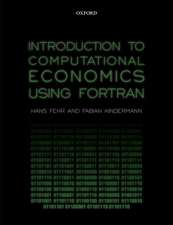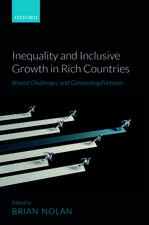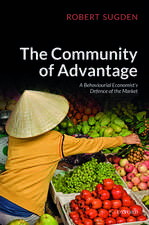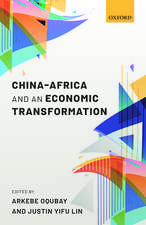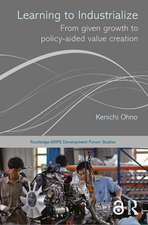How Nations Learn: Technological Learning, Industrial Policy, and Catch-up
Editat de Arkebe Oqubay, Kenichi Ohnoen Limba Engleză Hardback – 19 iun 2019
Preț: 584.10 lei
Preț vechi: 835.03 lei
-30% Nou
Puncte Express: 876
Preț estimativ în valută:
111.78€ • 121.38$ • 93.90£
111.78€ • 121.38$ • 93.90£
Carte tipărită la comandă
Livrare economică 11-17 aprilie
Preluare comenzi: 021 569.72.76
Specificații
ISBN-13: 9780198841760
ISBN-10: 0198841760
Pagini: 368
Dimensiuni: 162 x 239 x 26 mm
Greutate: 0.7 kg
Editura: OUP OXFORD
Colecția OUP Oxford
Locul publicării:Oxford, United Kingdom
ISBN-10: 0198841760
Pagini: 368
Dimensiuni: 162 x 239 x 26 mm
Greutate: 0.7 kg
Editura: OUP OXFORD
Colecția OUP Oxford
Locul publicării:Oxford, United Kingdom
Recenzii
How Nations Learn is a book based on big ideas. Why do some nations grow faster than others? How does the process of economic catch-up work? What does the technological learning of firms have in common with the policy lessons of governments? How do the answers to these questions vary across countries and regions of the world? The book provides answers to these queries from a distinguished interdisciplinary and international set of scholars, who draw on an impressive reservoir of both contemporary and historical experiences. How Nations Learn is an essential guide to how to navigate the key dilemmas of 21st century development, which should be particularly useful to latecomer countries and those grappling with the pitfalls of uneven development.
While debates on the best strategies for development have been protracted and contentious, there is widespread agreement on the salience of industrial policy and technological progress, but a paucity of studies on how this has been accomplished. The few books published have often been regionally or country based, limited in their scope of explanation, and analytically narrowed by their fealty to a single theoretical tradition. In contrast, this timely collection brings new critical insights into the dynamics of learning with a comparative analysis that is richly diverse in its geographic and theoretical focus, multidimensional in its level of analysis, and probing in its evaluation of how countries developed key capacities and transcended exigent historical barriers. A welcome addition to the literature that is highly recommended.
The limited capacity of developing countries to catch up the income level of developed countries has continued to be a major feature of international development over the past decades. Professors Oqubay and Ohno have been able to collect a fantastic set of papers on the crucial question of success and failure in achieving convergence: how technological learning takes place at the firm, sectorial, and national level, allowing countries to catch up, but also how failure to do leads to divergence. It considers the success stories of Meiji Japan, Taiwan, Korea, Singapore, and most recently of China, but also the strong challenges faced in other regions, and notably in Latin America and Africa. A must read for academic and policymakers alike.
Industrialization has always been fundamental to sustained economic growth. It separates the world into high and low-income economies. To create inclusive prosperity, we urgently need to understand how nations learn. State-supported innovation is not only cardinal for catch-up, but also to abate climate breakdown (through crowding in new businesses, nurturing experimentation, and ensuring public benefits). By studying the economic history of technological advancement in Africa, Asia, and Latin America, this book makes a powerful case for industrial policy.
'Catch-up' economic development requires technological and policy learning. It increasingly requires unlearning as well. And will and discipline. The editors of How Nations Learn have assembled a stellar group of contributors to share what they have learnt about learning, across time periods and continents, spanning technological learning by companies and policy learning and capability building by states. A most valuable resource for anyone interested in historical lessons applied sensitively to contemporary development challenges.
The analysis of development and catching-up has finally shifted away from surrealproblems of 'optimal' market-driven allocation of resources, toward the processes of learning and capability accumulation. This is an important contribution in this perspective: And yet another nail into the coffin of the'Washington Consensus'.
Arkebe Oqubay and Kenichi Ohno's important edited book is basically about learning to 'catch up'. It focuses on firm level technology learning and policymakers' learning, including learning by doing, emulation andexperimentation, involving innovation, and leapfrogging. The volume draws on historical, firm, industry, and country experiences to identify factors crucial to successful learning for catching-up, including latecomer advantages. The chapters suggest that the intensity, pace, 'direction' and context of learning matter, besides stressing the significance of robust industrial policies and long-term strategic vision.
The chapters examine how industrial latecomers have crafted strategic and pragmatic policy frameworks to unleash the universal passion for learning into business organizational practices that drive production capability development and foster innovation dynamics. The transformational experiences described in the book offer a multitude of ways in which learning is organized and applied to advance a nation's productive structures and build competitive advantage in the global economy
While debates on the best strategies for development have been protracted and contentious, there is widespread agreement on the salience of industrial policy and technological progress, but a paucity of studies on how this has been accomplished. The few books published have often been regionally or country based, limited in their scope of explanation, and analytically narrowed by their fealty to a single theoretical tradition. In contrast, this timely collection brings new critical insights into the dynamics of learning with a comparative analysis that is richly diverse in its geographic and theoretical focus, multidimensional in its level of analysis, and probing in its evaluation of how countries developed key capacities and transcended exigent historical barriers. A welcome addition to the literature that is highly recommended.
The limited capacity of developing countries to catch up the income level of developed countries has continued to be a major feature of international development over the past decades. Professors Oqubay and Ohno have been able to collect a fantastic set of papers on the crucial question of success and failure in achieving convergence: how technological learning takes place at the firm, sectorial, and national level, allowing countries to catch up, but also how failure to do leads to divergence. It considers the success stories of Meiji Japan, Taiwan, Korea, Singapore, and most recently of China, but also the strong challenges faced in other regions, and notably in Latin America and Africa. A must read for academic and policymakers alike.
Industrialization has always been fundamental to sustained economic growth. It separates the world into high and low-income economies. To create inclusive prosperity, we urgently need to understand how nations learn. State-supported innovation is not only cardinal for catch-up, but also to abate climate breakdown (through crowding in new businesses, nurturing experimentation, and ensuring public benefits). By studying the economic history of technological advancement in Africa, Asia, and Latin America, this book makes a powerful case for industrial policy.
'Catch-up' economic development requires technological and policy learning. It increasingly requires unlearning as well. And will and discipline. The editors of How Nations Learn have assembled a stellar group of contributors to share what they have learnt about learning, across time periods and continents, spanning technological learning by companies and policy learning and capability building by states. A most valuable resource for anyone interested in historical lessons applied sensitively to contemporary development challenges.
The analysis of development and catching-up has finally shifted away from surrealproblems of 'optimal' market-driven allocation of resources, toward the processes of learning and capability accumulation. This is an important contribution in this perspective: And yet another nail into the coffin of the'Washington Consensus'.
Arkebe Oqubay and Kenichi Ohno's important edited book is basically about learning to 'catch up'. It focuses on firm level technology learning and policymakers' learning, including learning by doing, emulation andexperimentation, involving innovation, and leapfrogging. The volume draws on historical, firm, industry, and country experiences to identify factors crucial to successful learning for catching-up, including latecomer advantages. The chapters suggest that the intensity, pace, 'direction' and context of learning matter, besides stressing the significance of robust industrial policies and long-term strategic vision.
The chapters examine how industrial latecomers have crafted strategic and pragmatic policy frameworks to unleash the universal passion for learning into business organizational practices that drive production capability development and foster innovation dynamics. The transformational experiences described in the book offer a multitude of ways in which learning is organized and applied to advance a nation's productive structures and build competitive advantage in the global economy
Notă biografică
Arkebe Oqubay is a Senior Minister and Special Adviser to the Prime Minister of Ethiopia and has been at the centre of policymaking for over twenty-five years. He is a research associate at the Centre of African Studies in the University of London, and holds a PhD in development studies from SOAS, University of London. He is the former mayor of Addis Ababa and winner of the ABN Best African Mayor of 2006, and finalist for the World Mayor Award 2006. He is a recipient of the Order of the Rising Sun, Gold and Silver Star and serves as board chair of several leading public organizations and international advisory boards. His work includes Made in Africa: Industrial Policy in Ethiopia (OUP, 2015); African Economic Development: Evidence, Theory, and Policy (OUP, 2019); and China-Africa and an Economic Transformation (2019, OUP). He was recognized as one of the 100 Most Influential Africans of 2016, and a 'leading thinker on Africa's strategic development' by the New African.Kenichi Ohno is a Professor at the National Graduate Institute for Policy Studies, Tokyo. He has previously worked at the International Monetary Fund and taught at the University of Tsukuba and Saitama University. He works closely with the Japanese government in designing international cooperation strategy. He has advised the Vietnamese government since 1995 and has done policy research in over twenty countries in Asia and Africa focusing on industrialization, policy learning for catch-up, the development experiences of Japan latecomers, and international comparison of industrial policy quality. His books include The History of Japanese Economic Development (Routledge, 2018), Learning to Industrialize (Routledge, 2013), and Eastern and Western Ideas for African Growth (Routledge, 2013). He received the Presidential Medal for Friendship from the Vietnamese government and the Japanese Foreign Minister Award for contributing to Japan-Vietnam economic relationship.
